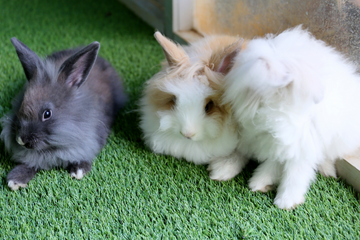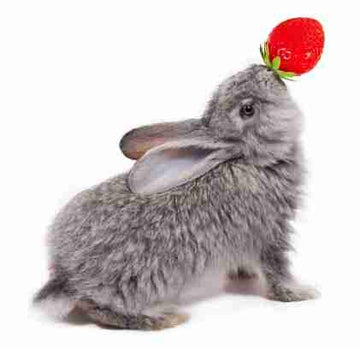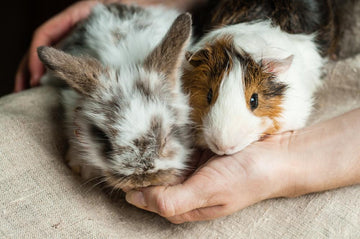Rabbit Loss of Appetite: 3 Common Health Issues That May Be the Cause
When your rabbit refuses to eat, it's a cause for concern. Unlike other pets, rabbits require constant feeding to maintain their health and digestive function. A rabbit's loss of appetite can lead to severe complications if not addressed quickly. From dental issues to gastrointestinal problems, there are many potential reasons your bunny may have stopped eating.
Click Here For a Guide to Understanding Your Rabbits Diet.

In this guide, we'll explore three common health problems behind rabbit loss of appetite and provide practical advice to help your furry friend recover.
Recognizing Rabbit Loss of Appetite
Appetite changes in rabbits aren't just picky eating—they're often a sign of underlying health issues. Rabbits are prey animals, meaning they instinctively hide signs of illness. This makes it essential for owners to act quickly when they notice their rabbit isn't eating as usual.
Here's what to look out for:
-
Refusal to eat their favorite foods, including hay
-
Unusual lethargy or hiding behavior
-
Smaller or irregular droppings
When you notice these signs, take immediate steps to identify the cause. The following sections explore the most common reasons rabbits stop eating and what you can do about them.

1. Dental Problems and Rabbit Loss of Appetite
Dental issues are among the most frequent causes of rabbit appetite loss. A rabbit's teeth grow continuously throughout their life. Chewing on hay helps wear down their teeth, keeping them at a manageable length. Without sufficient chewing, the teeth can overgrow, causing pain and making it difficult for your rabbit to eat.
Overgrown teeth can also lead to molar spurs—sharp points that form on the teeth. These spurs can cut the inside of your rabbit's mouth, causing discomfort and further discouraging them from eating. Symptoms of dental issues include drooling, selective eating, or noticeable changes in behavior.
To prevent dental problems, provide your rabbit with coarse hay, such as:
-
Coarse Timothy Hay
-
Medium Timothy Hay
-
Coarse Orchard Grass
Additionally, consider offering rabbit-safe chew toys, like apple chew sticks, to promote healthy teeth. If you suspect a dental problem, consult a vet specializing in rabbit care for an examination and possible treatment options.
2. Pain and Discomfort
Rabbits often experience appetite loss when they're in pain. This pain might come from a recent surgery, an injury, or internal discomfort caused by gas or bloating. Rabbits are especially prone to gas buildup, which can make them reluctant to eat.
Signs of gas pain include your rabbit hunching over or pressing their belly to the ground. Certain foods, like broccoli or cabbage, can increase the risk of gas buildup. If you think gas might be the problem, consult your veterinarian for treatment options. Gentle massages or medications may help ease their discomfort.
For post-surgery pain, you can encourage your rabbit to eat by offering fragrant greens like mint, basil, or parsley. These foods are more enticing and can kickstart their appetite. However, always follow your vet's recommendations for post-surgery care, including hand-feeding products made for recovery if necessary.
3. Gastrointestinal Stasis (GI Stasis) in Rabbits
Gastrointestinal Stasis (GI Stasis) is a severe condition that occurs when your rabbit's digestive system slows down or stops completely. This condition often starts with appetite loss and can quickly become life-threatening. Rabbits rely on a fiber-rich diet to keep their digestive system moving. Without enough fiber, bad bacteria can build up in their intestines, releasing gas and toxins that cause pain.

Symptoms of GI Stasis include small, irregular droppings, lethargy, and a hunched posture. If untreated, GI Stasis can lead to liver failure or death. Time is critical, so seek veterinary care as soon as you notice signs of this condition.
To prevent GI Stasis, feed your rabbit a consistent diet of high-fiber hay, such as Timothy Hay. Fresh water and regular exercise are also crucial to maintaining their digestive health. For a deeper understanding of GI Stasis and its prevention, read this article.
Steps to Take When Your Rabbit Stops Eating
If you notice rabbit loss of appetite, act quickly. Here are some steps you can take:
-
Offer a variety of hays to reignite their interest in eating.
-
Provide fresh greens and fragrant herbs as a temporary appetite booster.
-
Ensure they have access to fresh, clean water at all times.
-
Reduce stress in their environment by keeping noise and activity levels low.
Most importantly, contact a veterinarian as soon as possible. A loss of appetite is often a symptom of a serious condition that requires professional attention.
Choosing the Best Hay for Your Rabbit
A healthy diet is the best way to prevent appetite issues in rabbits. High-quality hay supports their digestive system and keeps their teeth in good condition. If you're unsure about the best hay for your bunny, download our Hay is for Rabbits eBook. This guide explains the benefits of different types of hay and how to choose the right one for your rabbit.
Already know what your rabbit loves? Visit our online store to explore premium hay options and have them delivered directly to your door.
Conclusion: Helping Your Rabbit Overcome Appetite Loss
Rabbit loss of appetite can be caused by dental problems, pain, or GI Stasis, but with prompt attention, these issues can often be resolved. Keep an eye on your rabbit's behavior and dietary habits, and don't hesitate to consult a veterinarian when needed. A balanced diet, regular checkups, and a stress-free environment are the best ways to keep your bunny happy and healthy.
Looking for more tips? Explore our blog for expert advice on rabbit care, diet, and health.

Fun and Unique Names for Rabbits

Healthy Rabbit Treats for Hoppy Pets






![RHDV2 Critical Information + Frequently Asked Questions [Updated 03/20/2025]](http://www.rabbitholehay.com/cdn/shop/articles/rhdv2-critical-information-frequently-asked-questions-V1.png?v=1742490107&width=360)

